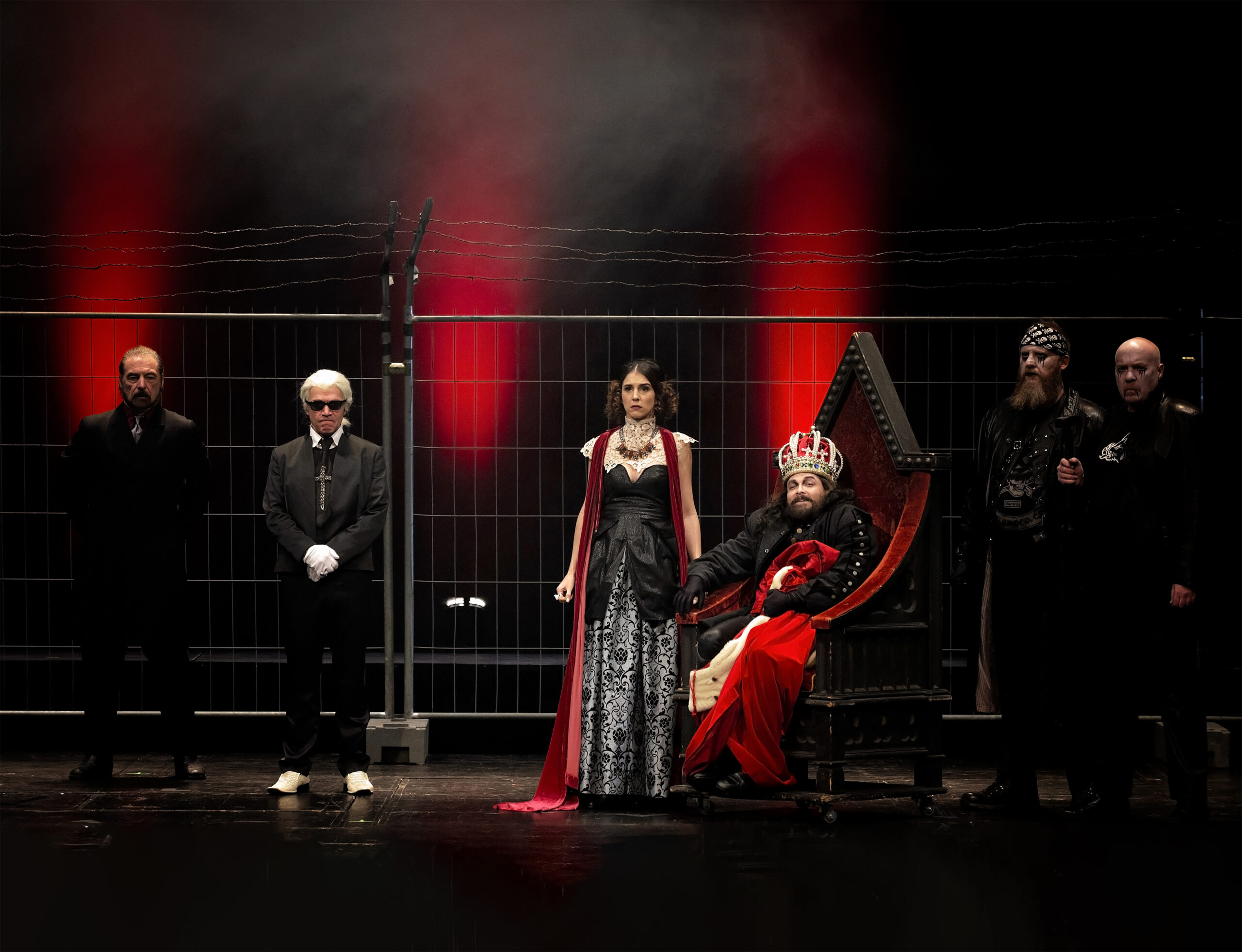Our Man in Prague
Guy Roberts founded a thriving Shakespeare Company in the Czech capital

Roberts starred as the title character in this 2019 performance of Richard III, with his wife, Jessica Boone, as Lady Anne. Photos by Kaja Curtis
Our Man in Prague
Guy Roberts founded a thriving Shakespeare Company in the Czech capital
Growing up in Texas, Guy Roberts thought he would be a painter like his grandfather, but Shakespeare got in the way. “When I was 15, I had heard there was this film called Hamlet by this guy named Laurence Olivier, and it won a bunch of Oscars and was supposed to be really amazing, so I watched it,” he says. “It’s a bit strange to talk about, but I had what I would probably describe as a near religious experience.
“Here was this man speaking the most beautiful words that my conflicted teenage soul seemed to connect with,” recalls Roberts (’94). “He lived in a castle. He had a sword fight, which he won even after he was poisoned. I just thought, wow, what more do you want out of life? And so, from that moment, it was Shakespeare for me.”
He started a Shakespeare club at his Houston high school; the Bard’s words carried him to a BFA in acting from the College of Fine Arts, and a professional career as an actor and a director. He had his own small company in New York and was artistic director of the Austin Shakespeare Festival for several years. In 2007, he got a grant from the city of Austin to travel to the Czech Republic to direct a production of Macbeth in Prague. There, he found a new artistic home.


Left: Roberts as Lucio in a 2018 production of Measure for Measure. Right: Roberts (sitting) as the titular character in a 2017 production of Macbeth, with Jessica Boone as Lady Macbeth and Jeff Smith as Banquo.
A Rich Theater Tradition
Roberts is founder and artistic director of the 16-year-old Prague Shakespeare Company (PSC), a professional, English-language theater company with a full-time staff of about 10—including his wife, producer and actor Jessica Boone—and a roster of multinational artists. He manages the company, directs and acts in its plays, acts in Hollywood productions filming in the Czech Republic (including Amazon Prime Video’s The Wheel of Time), and performs internationally.
On his second day in Prague in 2007, he was walking across the 14th-century Charles Bridge over the Vltava River and realized that he wanted to live in Europe. At that time, Prague was perhaps the only major European city that didn’t have a professional English-language company, he says.
“I thought, I’ll move to Prague. I’ll start the English-language theater. But I’ll make Shakespeare and classical theater the core aesthetic of our work,” he says over Zoom from his office in the capital city. “The decision to go into a life in the theater is ridiculously hard in America. Doing it in a foreign country, in a language that’s not the native language of the country, is probably the definition of madness and insanity.”
But he and PSC have thrived. At their 140-seat home theater, they present dramas, comedies, and musicals, and commission new plays. Many of their productions also tour the US and other locations around the globe. This fall’s shows included Romeo and Juliet, The 39 Steps, and The Book of Will.
The decision to go into a life in the theater is ridiculously hard in America. Doing it in a foreign country, in a language that’s not the native language of the country, is probably the definition of insanity.
The PSC has also succeeded in part thanks to a decade-long partnership with the Czech National Theatre; it has presented 23 productions at the Estates Theatre, which is part of the National Theatre and the stage where Mozart premiered Don Giovanni in 1787. “It’s sort of the jewel of the country,” Roberts says. They’ve also been part of the Summer Shakespeare Festival at Prague Castle, started by former president Václav Havel, himself a playwright and poet.
Watch this trailer for Prague Shakespeare Company’s 2019 performance of Richard III. Courtesy of Prague Shakespeare Company
There’s a special fondness for Shakespeare in the Czech Republic, Roberts says. Under communism, a Shakespeare play was safe to produce but could also carry coded or hidden messages about society—a vital outlet for expression.
Another big part of the PSC’s work is education. Summer and winter intensive Shakespeare programs bring students of all ages from around the world into their productions alongside the pros. “What I was trying to do was capture in a bottle, in a small intensive experience, my four years at BU,” he says.
At the time, BU had a relationship with the Huntington Theatre Company, and Roberts wrangled a meeting with Peter Altman, then the producing-director. “The upshot was, I did six shows at the Huntington by the time I graduated and I had my Equity card.”
Theater works differently in Prague than the United States. Instead of striving for corporate and foundation sponsorship, companies are often subsidized by the government, and ticket prices are low. Instead of scheduling one play for weeks or months, companies will have several at a time in repertory, playing once or twice a month; PSC has been doing its Macbeth for a decade.
But some things are the same everywhere. COVID made for a brutal couple of years, and at one point the company raised $40,000 to help keep food on the table for its artists. Audiences are returning, but as in America, they tend to buy tickets at the last minute now, and outdoor shows are an easier sell.
Theater is “extremely revered” as an art form in the Czech Republic, Roberts says, with a rich tradition and a vibrant community of artists. “It’s so respected that, from my understanding with my Czech friends, when you tell your parents you want to be an actor or go into the theater, they don’t say you should be a doctor or lawyer instead,” he says with a smile. “What’s nice is to live in a country where even young people dress up to go to the theater.”
